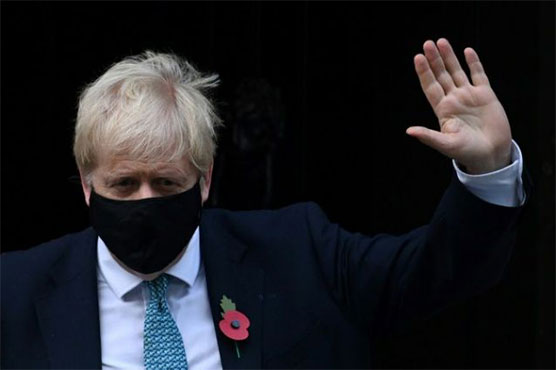UK's Johnson under fire as new lockdown looms for England

Boris Johnson on Monday defended his belated decision to impose a second coronavirus lockdown.
LONDON (AFP) - British Prime Minister Boris Johnson on Monday defended his belated decision to impose a second coronavirus lockdown as critics claimed he could have saved "thousands" of lives by acting sooner.
After persisting for weeks with local and regional restrictions, Johnson announced at the weekend that a new nationwide lockdown would come into force from Thursday and end on December 2, bringing England into line with other parts of the UK and Europe.
Scientific models show that, without immediate action, the number of deaths over the winter months could double those in the first wave earlier this year, and hospitals would soon be overwhelmed, Johnson told the House of Commons.
"I am truly sorry for the anguish these measures will impose, particularly for businesses that had just got back on their feet," he said.
"But it s now clear that we must do more together."
Opposition Labour leader Keir Starmer accused the prime minister of a "catastrophic failure of leadership", but Johnson vowed "no apologies" for resisting an earlier national lockdown, given the impact on lives, mental health and livelihoods.
"I believe it was right to try every possible option to get this virus under control at a local level," he said.
The ramped-up response came as Britain surpassed one million cases, while its number of coronavirus-related deaths is nearing 47,000, the worst toll in Europe.
The government is extending a UK-wide furlough scheme to support staff wages in shut-down businesses that was due to expire on October 31.
Lisa Wright, who runs the King s Arms pub in the Yorkshire village of Askrigg, welcomed the furlough move and said another national lockdown was "inevitable".
"But it s still very sad," she told AFP.
"You know, we re here to offer a service. We re here to give people some relaxation time, and that s got to stop again. And that s quite hard to take as a business."
From Thursday, non-essential retailers in England will close, including hospitality venues such as pubs and restaurants, except for takeaways.
Restive members of Johnson s Conservative party, warning of more damage to the reeling economy, threatened to defy the prime minister in a parliamentary vote on Wednesday.
Tory backbencher Charles Walker said he would be voting against a "drift further into an authoritarian, coercive state", but the restrictions will still pass with support from opposition parties.
Labour s Starmer pointed out that government scientists had, in late September, urged a two-week "circuit-break" during October s half-term school holidays.
Johnson rejected that proposal at the time, and just a fortnight ago he said calls for another national lockdown were the "height of absurdity".
"I can t forgive the catalogue of mistakes that have cost lives and livelihoods," Starmer told a virtual annual meeting of the Confederation of British Industry (CBI).
"The central lesson of the first wave was ignored: that if you are to control this virus you have to act early and decisively, and that if you don t, the cost to people s health and the health of the economy is much, much worse."
CBI director-general Carolyn Fairbairn said the measures will be "truly devastating for businesses".
But professor Andrew Hayward, one of the scientists advising the government on its coronavirus planning, said the September proposal would have caused much less harm.
"I think if we had chosen a two-week circuit-break at that time, we would definitely have saved thousands of lives," he told BBC radio.
"And we would clearly have inflicted substantially less damage on our economy than the proposed four-week lockdown will do."


